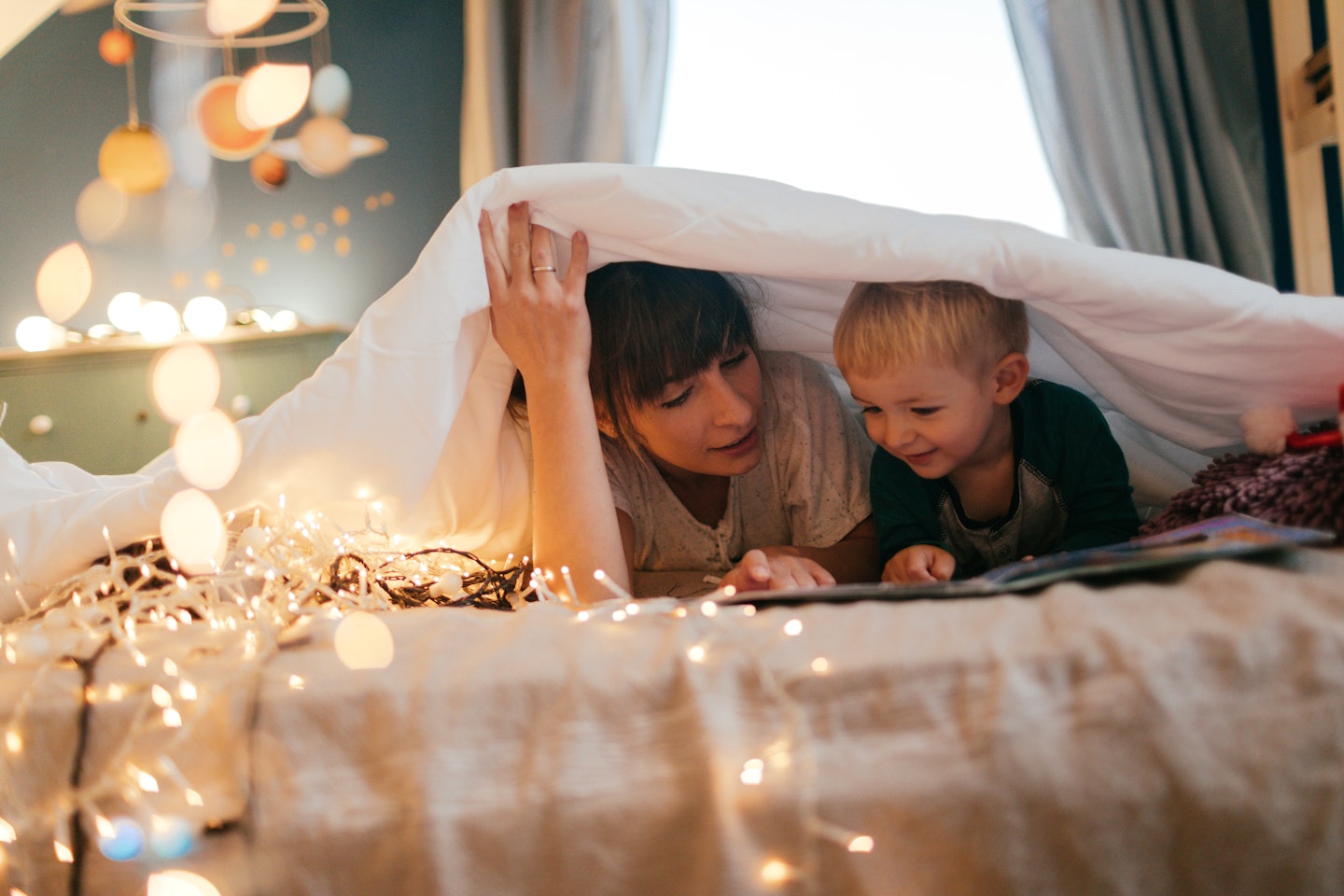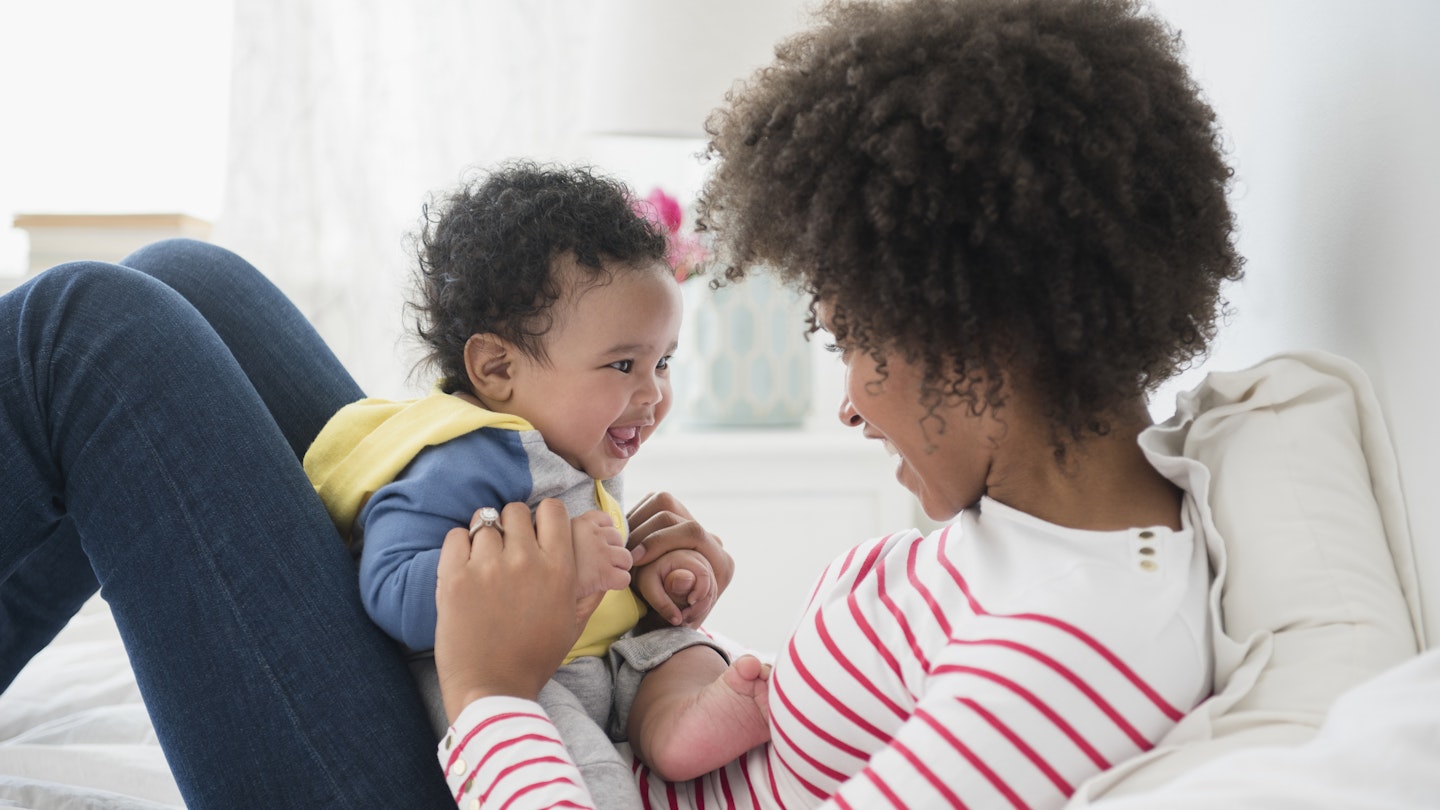Made a few New Year’s resolutions? Well, you might want to add a few more because we’re pretty sure that, if your tot had a say in the matter, these are the declarations he’d like to put on your list. They’re all teeny-tiny changes that you can easily, easily make.
‘By making some really small shifts in your thinking and doing as a mum, you can have a big impact on your child,’ says parenting expert Sarah Ockwell-Smith.
1. I’ll try to say ‘yes’
According to a UCLA study, the average toddler hears the word ‘no’ a massive 400 times a day. Eek! ‘If you keep saying “no” to your child, what ultimately happens is he stops listening because he hears it so much. So restrict the word “no” to the times when you really don’t want him to do something. Stop and think, “Can I say ‘yes’ to this? Do I really need to say ‘no’?” Try, too, to create an environment where you don’t need to say “no” so much – so if your toddler keeps picking up an ornament, and you’re always saying, “No, don’t touch,”, simply move that object out of reach. It sounds simple, but it can make a huge difference.’
Real mum: ‘I ask myself why I am saying “no” before I say it. I think, is it unsafe? Is it bad manners? Is it against the rules? If not, then do I really need to say no? My three-year-old always wants to sit in the motorised toys outside the supermarket on the way in and the way out. I used to say no and usher him inside, but now we have 20 seconds sit-and-play on the way in and out and it actually saves more time than trying to pass them by!’ - Sarah Sunderland from West Yorkshire is mum to Arthur and Charlotte.
2. I’ll leave when it’s time to go
It’s getting to the end of playgroup, everyone is sitting down to sing "The Wheels on the Bus", when your baby starts yawning and rubbing his eyes. What do you do? Carry on, of course. We all do this, staying to the end of a group or activity or just a family visit when our tots are tired. Why? Well, just because, really.
‘Try and be more flexible and child-led,’ suggests Sarah. ‘For example, if you’re at playgroup and your child isn’t enjoying it, or is tired, don’t feel like you need to stay until the end. Think about what you’d do as an adult: if you were out with friends and felt so tired you wanted to sleep, you’d make your excuses and leave. Or if you didn’t feel like meeting up in the first place, you’d text and rearrange. And it’s okay to change your plans with your youngster, too.’
Which means if your baby is tired after not sleeping well last night, or you’ve noticed he gets overwhelmed in the rush of everyone leaving together at the end, leave early. By prioritising your tot’s needs above what you think you’re supposed to do, chances are both you and your little one will be much more content!
3. I will embrace the mess
Aah mealtimes, the moments in your day when your kitchen floor and your baby are covered in food. But rather than cleaning up as you go, let your tot get super-messy. A 2013 study at the University of Iowa found letting children get messy with food impacts their brain development and the way they learn. This is backed up with research from the University of Leicester in 2017 which found children who were allowed to play with their food were more likely to snack on it later.
‘Children are naturally neophobic, which means they have a fear of new things,’ says Sarah. ‘It’s also common for them to have a dislike of certain textures like “slimy” mushrooms. Help your youngster overcome this by letting him get stuck in and explore different foods with his hands. Don’t give him cutlery, don’t worry about him getting dirty, and hold back on the wipes! Hold back on saying words like “yucky” and “messy” too, and let him use his hands and smear the food on his face if he wants.'
4. I will see the world through his eyes
Putting yourself in your tot’s shoes will help you understand why he behaves in the way he does, from sleep (or not!) to tantrums. ‘Take a few seconds to think about how your child is feeling, and why,’ suggests Sarah. ‘If he won’t put his coat on to leave, then why is he doing that and how is he feeling? Perhaps he doesn’t know where you’re going now, or he doesn’t want to go out.’ And this little insight will mean you handle the situation very differently.
Learning about the different developmental stages will also help you to work out more of what might be behind your tot’s refusal to share or why he’s having a tantrum in the supermarket toy aisle. ‘Understand how his brain is developing and what he is capable of doing at each stage,’ suggests Sarah. ‘For example, knowing that he may have separation anxiety between 8 and 16 months helps to explain a sleep issue or not wanting to be left at nursery.’
5. I will create a chill-out zone
Create a comfy corner at home where you and your tot can relax together. What calms youngsters is gentle sensory stimulation – think squishy cuddly toys, a light that slowly changes colour, and a muslin with a drop of a child-safe essential oil. And when your little one gets overwhelmed or overstimulated, instead of switching on the TV, head to your chill-out zone. 'It’s key that you never send him there alone,’ adds Sarah. ‘Stay with him, because he just can’t calm down alone.’

6. I will let him control parts of his day
Giving your youngster a little bit of control will make a huge difference to his happiness. ‘Older babies and toddlers typically have very little control over their day,’ says Sarah. ‘Everything they do is dictated by their parent or carer, from where they go to what they eat. And if your toddler is struggling with this lack of control, you might be seeing him acting in a way that tries to get some of the decision-making back.’
Say goodbye to this power struggle by giving your tot some real control over his day. ‘You can do this in really practical, reasonable ways,’ says Sarah. ‘Get a really low chest of drawers and organise his clothes into different drawers - underwear in one, tops in another and bottoms in a third. Then tell your child to take one item from each drawer.’ And yes, you might find she’s wearing the princess dress instead of the nice Boden number – but having this choice and control will mean she’s far more content.
Real mum: ‘My son always wanted to wear superhero costumes, and I never let him. I think I just felt embarrassed, or that people would make comments or judge me as a mum. But it’s always been difficult to get my daughter dressed, so she chooses what to wear – princess dress included – as it makes getting out of the door much easier. And she gets lovely comments when we’re out which she’s thrilled about!’ - Gemma Hall, from Worthing is mum to Poppy and Harry.
7. I won’t feel guilty for sticking CBeebies on
OK, so Hey Duggee isn’t a good babysitter. But occasionally popping the TV on for your tot is totally okay. While there’s no official screen-time guidelines in the UK, the American Academy of Pediatrics recommends no screen-time at all for babies younger than 18 months but, between the ages of two and five, children should watch no more than one hour a day.
And it’s not just your youngster who will benefit from some downtime – it will give you some much-deserved rest. ‘Don’t feel bad!’ says Sarah. But do make the most of this TV time by putting your feet up and snuggling up with your little one.
‘Just sitting and cuddling you has a bigger impact on your child than playing with homemade playdough,’ adds Sarah. ‘Think back to your own childhood and you won’t remember all the elaborate crafts you did, but you will remember having cuddles with your mum.’

8. I will read the same bedtime book every night
Bored of Goodnight Moon? Your youngster isn’t! ‘Children love the predictability of the same book and enjoy reading it again and again with you,' says Sarah. ‘It’s the same reason why toddlers like to watch the same TV episode over and over again – they really love that they know what’s happening.’
Researchers at the University of Sussex found that reading the same book repeatedly every night helps your pre-schooler learn new words, too.
9. I’ll halve the number of toys in the toy box
Shape sorters, puzzles, ride-ons – yep, your tot has a lot of toys after Christmas! A study by the University of Toledo, Ohio, found children played with a toy twice as long when they had less toys to choose from. And in a German experiment, researchers packed away all the toys in a nursery for three months, and found the children played more creatively and were more social with each other without them.
‘Having too many toys is overwhelming,’ says Sarah. ‘And research shows that the more toys children have, the more they struggle to entertain themselves. So thin out the toys! Pack some away and see if your child misses them!’
10. I will question my automatic mum response
Ever find yourself telling your little one something and then realise you sound exactly like your own mum? We all repeat what we heard growing up but, next time you hear your mum-voice, just ask yourself, what do I think? Because you might just realise that you don’t really mind your tot pulling all the sofa cushions onto the floor and jumping on them. You just wish you’d been allowed to do it when you were little!
‘You might automatically say “Stop doing that!” not because you believe that he shouldn’t be doing it, but just because that’s what you were told as a child,’ says Sarah. ‘Question this automatic mum response. It’s up to you what boundaries you set.’
Real mum: ‘I’ve always felt I should tidy around me – until I realised that when the children remember their childhood, they won't remember if everything was always in its place or not – they’ll remember squealing in delight running around the house while I chase them which is their favourite game!’ - Jo Le Page, from the Channel Islands is mum to Isaac and Grace.
Sarah Ockwell-Smith is a parenting expert and mum-of-four. She’s the author of numerous parenting books including The Gentle Parenting Book.

